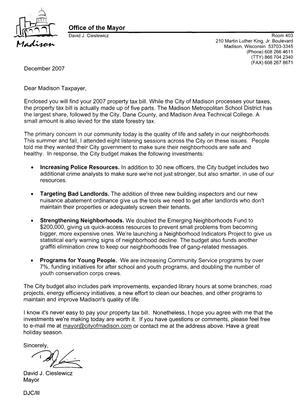
Madison Mayor Dave Cieslewicz:[72K PDF]
Enclosed you will find your 2007 property tax bill. While the City of Madison processes your taxes, the property tax bill is actually made up of five parts. The Madison Metropolitan School District has the largest share, followed by the City, Dane County, and Madison Area Technical College. A small amount is also levied for the state forestry tax.
The primary concern in our community today is the quality of life and safety in our neighborhoods. This summer and fall, I attended eight listening sessions across the City on these issues. People told me they wanted their City government to make sure their neighborhoods are safe and healthy. In response, the City budget makes the following investments:
- Increasing Police Resources. In addition to 30 new officers, the City budget includes two additional crime analysts to make sure we’ re not j ust stronger, but also smarter, in use of our resources.
- Targeting Bad Landlords. The addition of three new building inspectors and our new nuisance abat ement ordinance give us the tools we need to get after landlords who don’t maintain their properties or adequatel y screen their tenants.
- Strengthening Neighborhoods. We doubled the Emerging Nei ghborhoods Fund to $200,000, giving us quick-access resources to prevent small problems from becoming bigger, more expensi ve ones. We’ re launching a Neighborhood Indicators Project to give us statistical early warning signs of neighborhood decline. The budget also funds another graffiti elimination crew to keep our neighborhoods free of gang-related messages.
- Programs for Young People. We are increasing Communi ty Service programs by over 7%, funding initiatives for after school and youth programs, and doubling the number of youth conservation corps crews.
The City budget also includes park improvements, expanded library hours at some branches, road
projects, energy efficiency initiatives, a new effort to clean our beaches, and other programs to maintain and improve Madi son’ s quality of life.
These words are a useful look at the Mayor’s perspective on local taxpayers.
